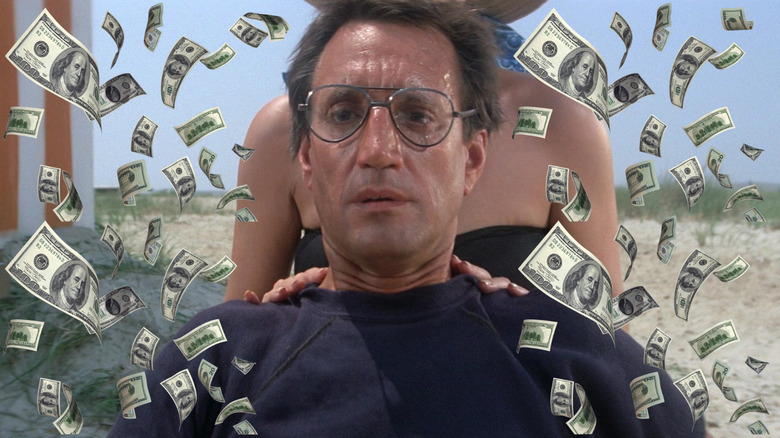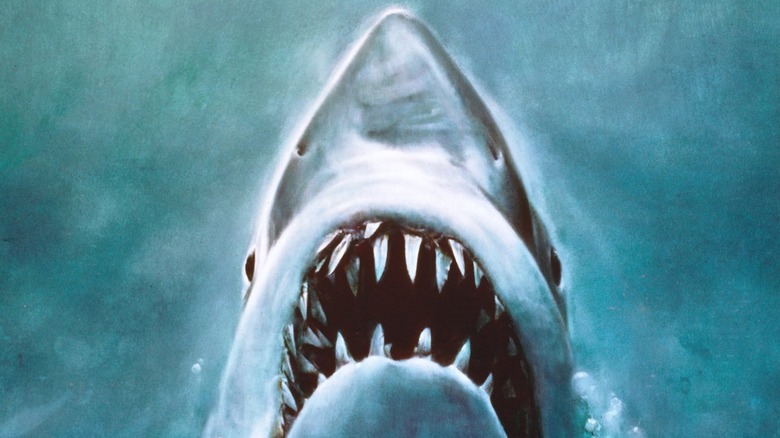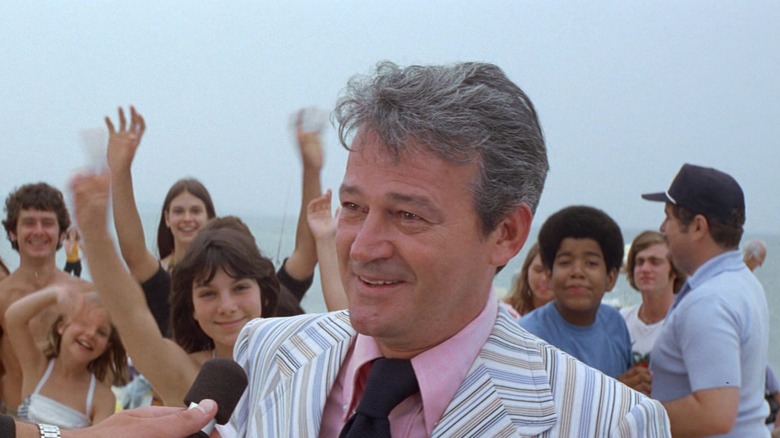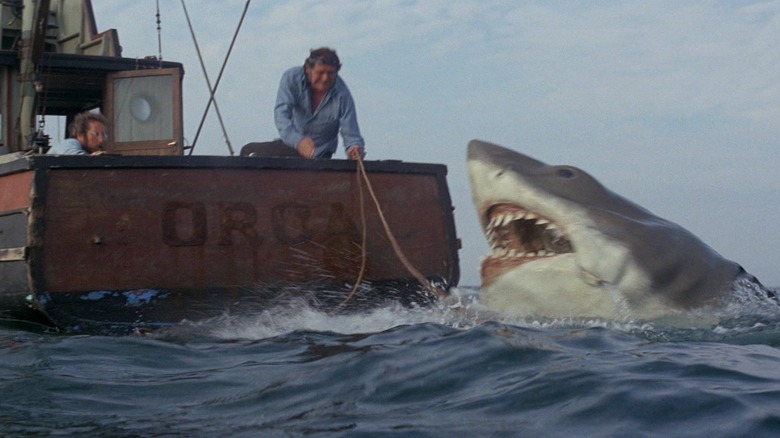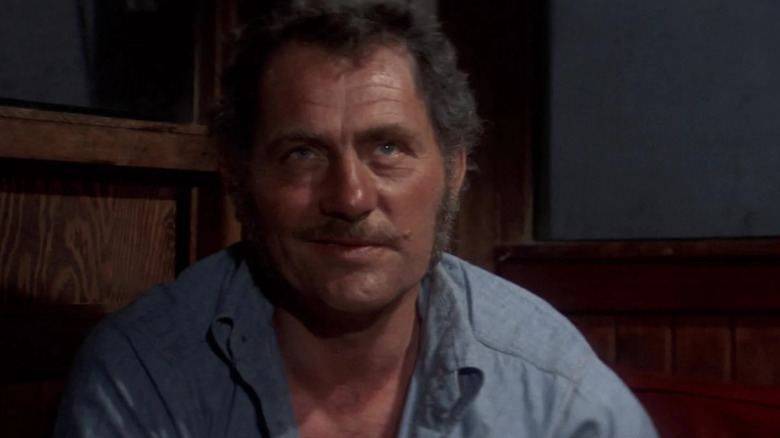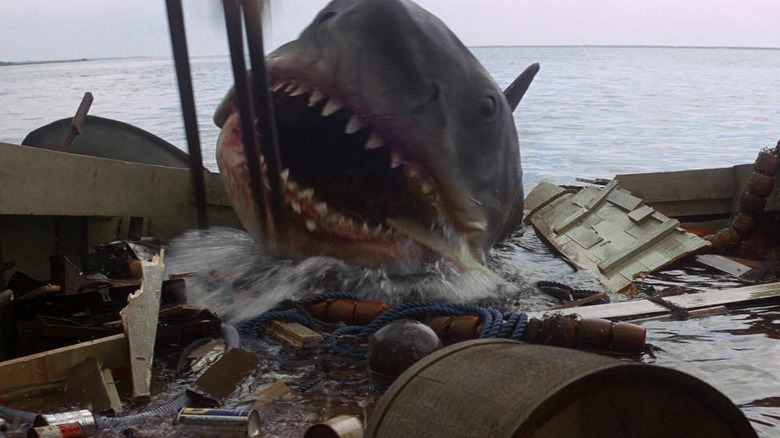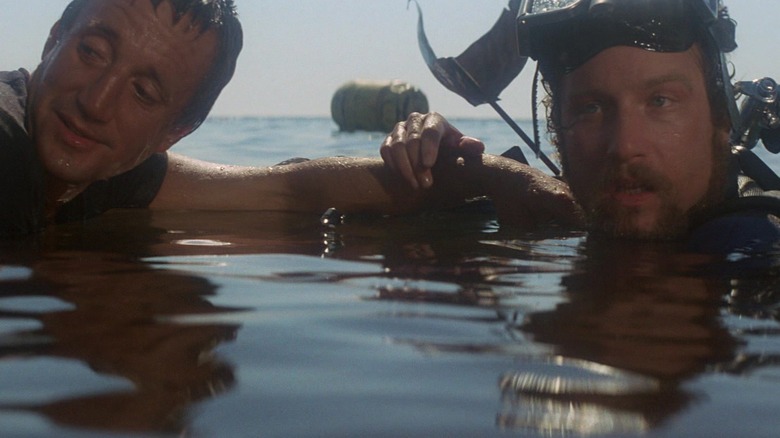50 Years Ago, Steven Spielberg's Jaws Reshaped The Box Office Forever
(Welcome to Tales from the Box Office, our column that examines box office miracles, disasters, and everything in between, as well as what we can learn from them.)
"When I think about 'Jaws,' I think about courage and stupidity. And I think of both of those things existing underwater." Those are the words of director Steven Spielberg speaking about his beloved 1975 blockbuster in "The Making of 'Jaws.'" The young Spielberg broke one of Hollywood's cardinal rules to film "Jaws" in the ocean, which made the production a brutal undertaking. "'Jaws' is a fun movie to watch but not a fun movie to make," Spielberg added.
Though the production may not have been fun, the more important point is that the movie, which is based on Peter Benchley's novel of the same name, is a great deal of fun for the audience. So much so that "Jaws" would go on to shatter box office records, becoming, for a time, the most successful motion picture in history. Rather than sinking Spielberg's budding career, it defined it for decades to come. It also changed the way big movies would be released forever. It is, by some measures, one of the most consequential movies ever made.
In this week's Tales from the Box Office, we're looking back at "Jaws" in honor of its 50th anniversary. We'll go over how it came to be, how the budget spiraled out of control, what happened once it hit theaters, what happened in the aftermath of its release, and what lessons we can learn from it all these years later. Let's dig in, shall we?
The movie: Jaws
The film takes place in the seaside community of Amity, which has suffered several grizzly attacks from a great white shark. With the town relying on summer tourism and fear on the rise, the town's chief of police Brody (Roy Scheider), a young marine biologist named Hooper (Richard Dreyfuss), and a grizzled shark hunter known as Quint (Robert Shaw) embark on a dangerous mission to destroy the animal before it kills again.
Much has already been written about the production of "Jaws." Although the primary focus of this piece is the release of the film and what happened after the film was released in theaters, it's worth discussing a bit about the production history. Very briefly, Spielberg was coming off of his acclaimed made-for-TV movie "Duel," as well as his first theatrical feature "The Sugarland Express." He was a rising star in Hollywood, and Universal Pictures offered him the chance to bring Benchley's novel to the big screen.
Spielberg signed on and was given a healthy (by 1975 standards) $3.5 million budget. By the time it was finished, Spielberg was more than 100 days over schedule, and the budget had ballooned to $12 million. That would be nearly $72 million in today's dollars. From issues with "Bruce," the mechanical shark, to contending with the elements in the ocean, just about everything that could go wrong did go wrong.
Yet, thanks to touches like an absolutely brilliant, simple score from John Williams, one of the greatest monologues in the history of cinema, and Spielberg's gift for storytelling, he came out on the other side with a damn fine motion picture. One that Universal had a great deal of confidence in.
How movies were released before Jaws
It's important to understand how movies were generally released at the time. Today, big movies arrive on thousands of screens all across the country on opening weekend. It's an accepted practice. Not in 1975. Back then, studios often did a platform release, meaning they played on a few screens in key cities before slowly expanding.
This practice is still used for indie movies, such as A24's smash hit "Everything Everywhere All at Once," but it's certainly not the norm. Wide releases weren't reserved for good movies in the early '70s. On the contrary, it was often for "bad" or nice movies so that they could make their money before word got out that they didn't have mass appeal — B-movies, exploitation films, and the like.
Universal released "Jaws" on well over 400 screens its opening weekend — one of the widest openings ever up to that point — after spending more than $700,000 on a massive media blitz. Members of the filmmaking team were doing the talk show circuit to get the word out. Per a 2015 report by PBS, for three nights before the movie's release, Universal blanketed primetime TV with 30-second trailers for the movie. This was, at the time, revolutionary.
"Before that, what we now call marketing departments were called publicity departments, because it was a publicity-driven business," Bob Levin, president of worldwide marketing and distribution for MGM and former head of marketing at Walt Disney Corp., told PBS in 2015. "You can't go back and find in the early days in the movie business vast amounts spent in advertising ... There was a movie preview, or we call it a trailer, but not a lot of advertising."
The financial journey
"Jaws" hit theaters on June 20, 1975, following that massive marketing campaign. Box office numbers weren't as widely tracked or readily available back then. Today, I could easily take you through every single weekend of the box office run of "Titanic" in great detail. It's not as easy to do that for this movie, but it's also not important. What is important is that Universal's bold strategy worked. It was a smash right out of the gate.
Spielberg's troubled shark picture opened to $7 million, easily topping the charts on its first weekend. In the weeks that followed, it hardly dropped at all as word got out that this was something truly special. In virtually no time at all, it passed box office smash hits like "The Exorcist" to become the highest-grossing movie ever up to that point. It did so even before an international release of any kind, as per producer Richard D. Zanuck in "The Making of Jaws."
Guinness World Records officially recognizes "Jaws" as the "first summer blockbuster film," pointing out that it became the first film to make more than $100 million at the U.S. box office. After just 80 days, that total had grown to nearly $125 million. In less than three months, Spielberg's film had far surpassed the likes of "The Godfather," which he has called the greatest American film ever made. It would go on to have similar success all over the world.
All told, through its various re-releases over the years, "Jaws" has made $273.6 million domestically to go with $210.6 million internationally for a grand total of $484.3 million and counting.
Jaws became a generational hit (and a big franchise)
Naturally, Universal saw dollar signs and proceeded to make a sequel. That materialized in the form of 1978's "Jaws 2," which Spielberg did not direct. All the same, it was another big hit. 1983's "Jaws 3-D" and the much-maligned 1987 fourth entry "Jaws: The Revenge" were far less so, but still successful on some level. None of them could match up to the power of the original critically or commercially, though, there's no question there.
One of the things that helped make the first "Jaws" such a commercial heavy-hitter extended beyond the box office. It was one of the first prominent examples in movie history of merchandising truly playing a role in its success. From beach towels to toys and an eventual home video release, Universal made a fortune from merch tied to the movie. Williams' score was also a big money-maker, having also won Best Original Score at the Oscars. It lost Best Picture to "One Flew Over the Cuckoo's Nest."
Much like the advertising preceding the release, the merch blanketed the landscape. "Jaws" was pervasive. It was a true pop cultural moment, far more than just a major motion picture. Future blockbusters would carve a similar path. When "Star Wars" became the biggest movie of all time in 1977, George Lucas ended up making more from the insane amounts of merchandise than he did from the movie itself. Global moments like that became possible thanks to wide releases. More importantly, wide releases in the summer season.
With Jaws, the summer blockbuster was born
Before the release of "Jaws," the summer was seen as a dead time for movies. Studios didn't release their biggest movies, or the ones they had the most confidence in during that period. Now? Summer is the season for movies, with studios competing for those prime summer release dates. That seismic shift in the way movies were released and the way they made money at the box office can be traced back to the success of Spielberg's beloved blockbuster. As noted by The New Yorker in 2012, Columbia had previously tried a massive media blitz for Charles Bronson's "Breakout" earlier that year. It just didn't pan out. The difference with "Jaws" was that the success forced Hollywood at large to pay attention.
"When you're looking at your broad films with significant box-office potential, the trick seemed to be television advertising. Nothing drove it like television advertising," Levin said in that same 2015 PBS interview. "Studios got more and more enamored with the power of television to open more screens, more theaters ... they found television to be this powerhouse."
It is summer movie classics that helped turn Spielberg into the most successful commercial director of all time. From "Raiders of the Lost Ark" to "Jurassic Park," his career would come to be defined by bold entries in the canon of blockbuster cinema that he helped give birth to. This is one of those rare moments in time that truly changed everything. There were movies before "Jaws," and there were movies after "Jaws." It's an ever-important dividing line in the sands of cinema history.
The lessons contained within
There is, simultaneously, so much to learn from "Jaws" 50 years removed from its landmark release, and nothing one can possibly hope to emulate in reflecting upon its success. It is a singular movie from a singular filmmaker made at a singular moment in time. While attempting to emulate its success would be a fool's errand, particularly in the streaming era, there is much modern Hollywood can (and should) take from it.
From the business side, embracing change is downright essential to the survival of cinema. Studios were perhaps too quick to embrace premium VOD and abandon theatrical distribution during the pandemic. Like anything, streaming is a tool, but used incorrectly, it can be deadly. As audience habits continue to change, studios would do well to think innovatively, just as Universal did in '75, to help keep the theatrical experience alive.
On the filmmaking side of things, its greatest lesson remains that sometimes less is more. Spielberg showed less of the shark because the damn thing kept breaking. The result was a better movie, one that became an all-time classic. Movies like "Green Lantern" were ruined by trying to throw money and more visual effects at problems. In the age of CGI, anything is possible, but that, in itself, can be limiting creatively.
Ideally, populist filmmaking can also be art. It doesn't have to just be mindless entertainment. It can be great cinema. "Jaws" remains a gold standard for such endeavors. Crucially, this game-changing success was built on the back of an excellent, visionary movie. That should never be lost in the conversation.
